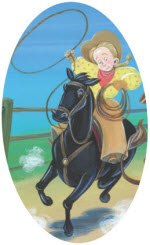In Lucille's Own Words. . .
“I feel sorry for the girls who never lived on a cattle ranch and have to attend so many teas, and be indoors so much, with never anything but artificiality about them.”
-The Saint Louis Republic, October 12, 1902
“It may look dangerous to tie a steer, but really, one doesn't have time to think of the danger when the time comes. And I have never been badly hurt, though I have tied ever so many big fellows. You must expect to get bruised and scratched, but if you are used to little things like that and know enough about the work to do it quickly you are generally safe from the ugliest kind of a steer. You see, the lasso is about his horns, and your horse, if he knows his business, is pulling for all he is able on the other end of the rope, so the steer is unable to get up.” -The Saint Louis Republic, October 12, 1902
“People in the East are very nice, but they don't know how to ride really. The women ride side-saddle, and they bump up and down so. I wish I could make them all ride cross-saddle. It's so much easier and more sportsman-like.”
-The Washington Post, September 7, 1907
“I ride because I like to, and I rope cattle because it is fun. I like to do things as well as I can, and it makes me feel nice to know that I can take care of myself in the country. I ride astride because it is the safest and most comfortable way.” -Riley, Glenda, Wild Women of the Old West, Fulcrum Publishing 2003
“[City life] is not as pleasant as a long stretch of country, where you can gallop about all day without running into a house or seeing anybody but the cowboys at work with the herds. There is always some new trick to be learned from them, and they are jolly company.” -The Saint Louis Republic, October 12, 1902
“My system of training consists of three things—patience, perseverance, and gentleness. Gentleness I consider one of the greatest factors in successful training . . . . Governor, the horse I ride in our exhibitions, was raised and trained on our ranch. He has nearly forty tricks (as we call them), and is capable of learning many more. He can shoot a gun; pull off a man's coat and put it on again; can roll a barrel; can walk up stairs and down again—a difficult feat; is perfect in the march and the Spanish trot; extends the forelegs so that an easy mount may be made; kneels, lies down, and sits up; indeed, he has received a good education, and does nearly everything but talk. He often utters sounds that would seem to indicate his desire to talk. “Grunts of satisfaction,” we call the sounds!” -Riley, Glenda, Wild Women of the Old West, Golden: Fulcrum Publishing 2003


